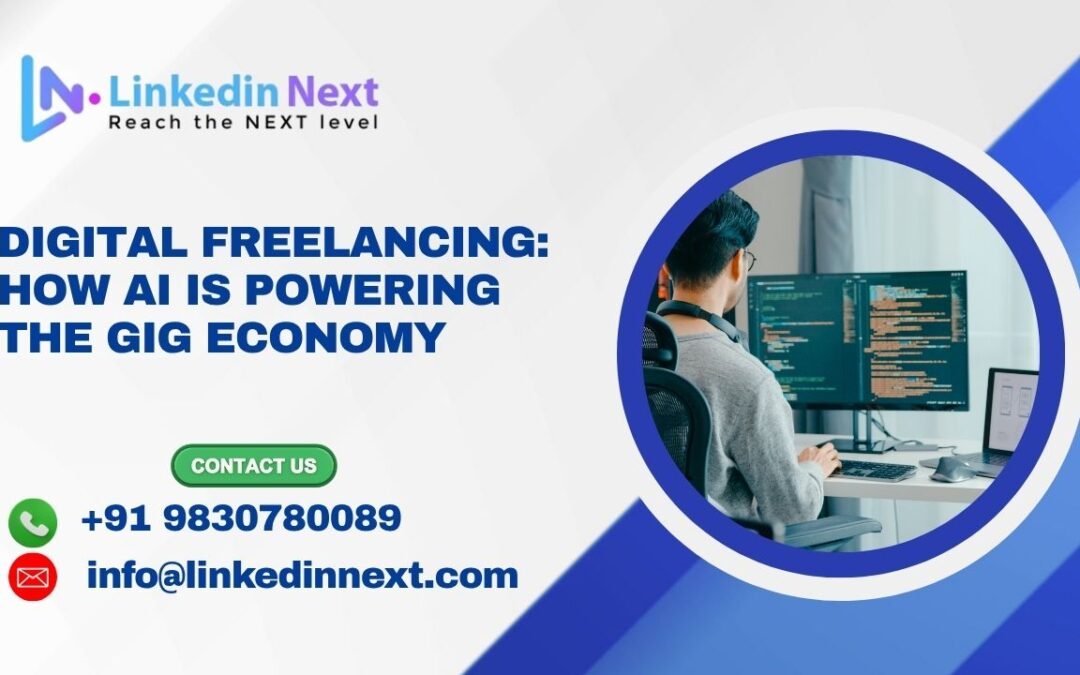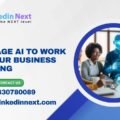Digital Freelancing: How AI Is Powering the Gig Economy.
Digital Freelancing: How AI Is Powering the Gig Economy. The gig economy has transformed the global job market, providing flexibility, independence, and opportunity to millions of professionals worldwide. With the rise of artificial intelligence (AI), this transformation has accelerated dramatically. Digital freelancing—once confined to simple writing or design tasks—now spans complex fields like AI development, data analytics, automation, and digital marketing. AI is not only reshaping the way freelancers work but also redefining how businesses connect, hire, and scale talent on demand.
In this new era, AI-powered platforms and smart tools are creating a more efficient, data-driven, and borderless freelancing ecosystem. Let’s explore how AI is revolutionizing the gig economy and empowering digital freelancers like never before.
The Intersection of AI and Freelancing
Artificial Intelligence is no longer just a buzzword — it’s the driving force behind today’s freelancing revolution. Platforms like Upwork, Fiverr, Toptal, and Freelancer.com are integrating AI to match freelancers with projects more accurately, optimize pricing, and streamline project management.
AI-powered algorithms analyze freelancer profiles, client feedback, skills, and past performance to predict the best matches. This means faster hiring, reduced human bias, and better results for both freelancers and clients. The outcome is a more efficient, transparent, and intelligent freelance economy.
How AI Is Empowering Digital Freelancers
1. Smarter Job Matching
Gone are the days when freelancers had to scroll endlessly through listings. AI-driven job platforms now use predictive analytics and machine learning to connect the right freelancer to the right client instantly. This technology examines multiple data points — from keywords and project history to engagement rates — to ensure perfect compatibility between freelancers and employers.
2. Personalized Skill Development
AI-based learning platforms such as Coursera, LinkedIn Learning, and Udemy leverage intelligent recommendations to help freelancers identify emerging skill trends and learning paths. For instance, a freelance marketer might receive AI-suggested courses in AI-driven SEO, ChatGPT prompt engineering, or data visualization, ensuring their skills remain competitive in an evolving marketplace.
3. AI-Assisted Productivity
Freelancers today rely heavily on AI tools to automate repetitive tasks and boost productivity. Tools like Jasper AI, Grammarly, Notion AI, and Canva Magic Write streamline content creation, communication, and organization. Meanwhile, AI-powered schedulers and time trackers help freelancers optimize their workflow and maintain work-life balance.
4. Enhanced Communication and Collaboration
AI-driven communication tools such as Otter.ai, ChatGPT, and Zoom AI Companion enable real-time transcription, smart meeting summaries, and automated follow-ups. These innovations enhance client collaboration, improve efficiency, and reduce misunderstandings — critical factors for remote freelancing success.
5. Intelligent Pricing and Negotiation
AI algorithms can now analyze market rates, project complexity, and freelancer experience to recommend optimal pricing. This helps freelancers avoid underpricing their work while ensuring competitiveness. Moreover, AI negotiation assistants can suggest contract terms and estimate project delivery timelines, helping freelancers project professionalism and confidence.
AI Tools Transforming the Freelance Landscape
Content Creation and Marketing
Freelancers in content, copywriting, and social media management now use AI to generate ideas, craft SEO-friendly content, and analyze engagement metrics. Tools like ChatGPT, Copy.ai, and SurferSEO allow writers to produce high-quality, optimized content in a fraction of the time.
Design and Creativity
Designers are embracing AI design tools like Midjourney, DALL·E, and Adobe Firefly to create stunning visuals and concepts instantly. These tools learn from design preferences and automate repetitive edits, freeing designers to focus on creativity.
Programming and Development
AI coding assistants such as GitHub Copilot, Replit Ghostwriter, and Tabnine enhance coding efficiency, reduce bugs, and accelerate project delivery. For freelance developers, this translates to higher output and more complex projects — without compromising quality.
Virtual Assistance and Data Management
Freelancers offering administrative or analytical services benefit from AI automation tools like Zapier, HubSpot AI, and Airtable AI. These solutions automate workflows, data entry, and reporting — allowing freelancers to scale operations effortlessly.
The Role of AI in Client-Freelancer Relationships
AI is improving more than workflows — it’s enhancing trust and transparency. Intelligent systems now track project progress, ensure timely delivery, and even monitor communication quality. Platforms use AI-driven reputation management to detect fake reviews, prevent fraud, and ensure fair evaluations.
Clients can now assess freelancer reliability through AI-based metrics, while freelancers receive insightful feedback to enhance performance. This data-centric approach builds long-term professional relationships rooted in mutual value and accountability.
The New Breed of AI Freelancers
As AI continues to evolve, entirely new categories of AI-focused freelancers are emerging. These include:
-
Prompt Engineers – Crafting optimized inputs for AI models to generate precise outputs.
-
Machine Learning Consultants – Assisting businesses in adopting AI for predictive analytics.
-
Automation Specialists – Implementing workflows using tools like Zapier and Make (Integromat).
-
AI Trainers and Annotators – Training datasets that improve AI accuracy.
-
Chatbot Developers – Designing conversational AI systems for business support.
This new class of freelancers blends creativity, technical knowledge, and AI literacy — becoming the backbone of digital innovation.
The Benefits of AI for Businesses and Freelancers
AI not only empowers freelancers but also transforms how businesses hire and manage them. The benefits include:
-
Faster Talent Acquisition: AI shortens hiring time by instantly identifying suitable candidates.
-
Improved Project Outcomes: Data-driven insights ensure better task alignment and quality assurance.
-
Global Access: Companies can access top freelancers worldwide, breaking geographical barriers.
-
Reduced Operational Costs: Automation minimizes the need for middle management and administrative overhead.
-
Enhanced Decision-Making: AI analytics provide actionable insights for both freelancers and clients.
This synergy between AI and human expertise fosters a mutually beneficial freelance ecosystem where both sides thrive.
Challenges in the AI-Driven Freelance Economy
Despite its many advantages, integrating AI into freelancing comes with challenges:
-
Job Saturation – As AI tools make freelancing more accessible, competition intensifies.
-
Data Privacy Concerns – Freelancers must ensure client data security while using AI platforms.
-
Dependence on Algorithms – Overreliance on AI for project matching or pricing may limit autonomy.
-
Ethical and Creative Boundaries – Maintaining authenticity while leveraging AI remains crucial.
Addressing these issues requires AI literacy, ethical awareness, and a balanced human-AI approach.
The Future of Freelancing in an AI-First World
The future of freelancing will be AI-augmented, not AI-replaced. As automation handles routine work, freelancers will focus on strategic, creative, and interpersonal aspects of their profession. Hybrid freelancers—those combining human insight with AI precision—will dominate the digital workforce.
We can also expect to see AI-driven freelance platforms offering virtual project managers, smart contract systems using blockchain, and reputation scoring powered by real-time analytics. This fusion of AI, blockchain, and gig work will define the next decade of digital entrepreneurship.
Conclusion: Embracing AI as a Freelance Partner
Artificial Intelligence is not the end of freelancing—it’s the evolution of it. By automating mundane tasks, enhancing creativity, and expanding global opportunities, AI empowers freelancers to achieve more freedom, efficiency, and income. The gig economy’s future belongs to those who adapt quickly, learn continuously, and embrace AI as a collaborative partner.
In this dynamic digital landscape, the smartest freelancers are not those who compete with AI — but those who leverage it to elevate their skills, deliver greater value, and shape the future of work.
Also read our more BLOG here.
Thank you for read our blog “Digital Freelancing: How AI Is Powering the Gig Economy”.
I hope this blog is helpful to you, if you have any question feel free contact us at
Call/WhatsApp: +91.9830780089 || Email: info@linkedinnext.com







Recent Comments